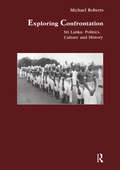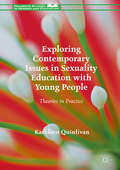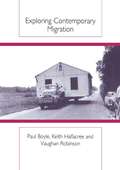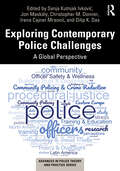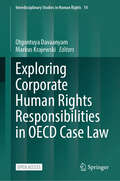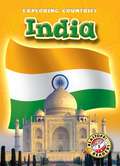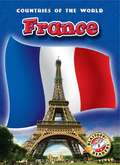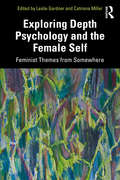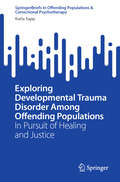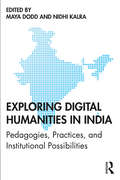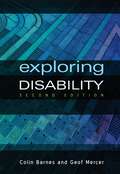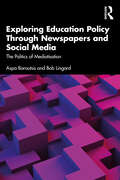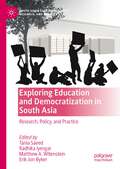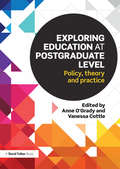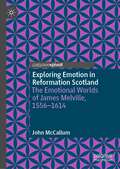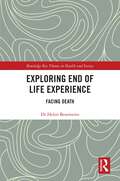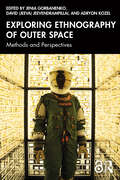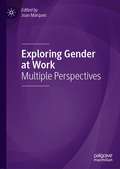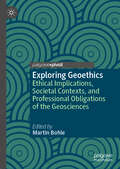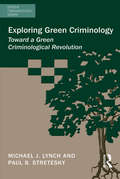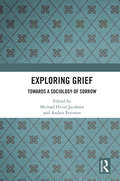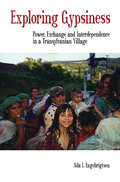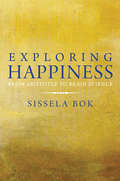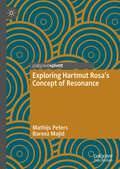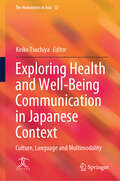- Table View
- List View
Exploring Confrontation: Sri Lanka: Politics, Culture and History (Studies in Anthropology and History)
by Michael RobertsSri Lanka has been the meeting point of many ideologies and ways of being. This has spelt heterogeneity, syncretism and conflict. In drawing upon the practices of empirical research promoted by Western intellectual traditions, the author demonstrates the strengths of these practices through his contextualised engagement with the pogroms of 1915 and 1983, as well as other incidents, as at the same time he delineates some of the limits of empiricist rationality.This book is replete with rich ethnographic detail and serves as an exercise in historical anthropology which illuminates Sri Lanka's political culture. It not only opens out the contrast between Western and Indian world views, but also explores the human condition by bringing out the immediacy surrounding acts of victimisation and human beings in conflict.
Exploring Contemporary Issues in Sexuality Education with Young People: Theories in Practice (Palgrave Studies in Gender and Education)
by Kathleen QuinlivanThis book explores contemporary issues in sexuality and relationship education for young people. Drawing upon rich empirical and ethnographic research undertaken with students and teachers in secondary schools, the author asks how school-based sexuality education can better equip young people to engage with contemporary social, political and cultural sexuality and relationships issues. Creatively working across both theoretical and practical contexts, this accessible work suggests approaches to sexuality and relationships education that can build upon the ways in which young people are developing a sense of identity; the ultimate aim being to help them to meet their emotional, spiritual and relational potential. Challenging established approaches to sexuality education, this thought-provoking book shines a new light on alternative perspectives that can help make sexuality and relationships education more relevant and meaningful for young people in a rapidly changing world. This volume will be of interest and value to students and scholars of sexuality and relationship education, as well as practitioners.
Exploring Contemporary Migration
by Paul Boyle Keith Halfacree Vaughan RobinsonExploring Contemporary Migration provides the first comprehensive introduction to the various aspects of population migration in both the developed and the developing worlds. Some of the most important quantitative and qualitative methods used for the description and analysis of migration are presented in a clearly structured and accessible way. The various theoretical approaches used to explain the complex patterns of migration are also summarised. These patterns are then explored through the use of specific migration-related themes: employment, stage in the life course, quality of life, societal engineering, violence and persecution, and the role of culture.Exploring Contemporary Migration is written in a user-friendly, accessible style, appealing to undergraduate students of population geography and social science students taking a population module. This text will also be valuable reading to those researchers and academics concerned with gaining a broad understanding of the dynamics and patterns of contemporary population.
Exploring Contemporary Police Challenges: A Global Perspective (Advances in Police Theory and Practice)
by Sanja Kutnjak Ivković Dilip K. Das Jon Maskály Christopher M. Donner Irena Cajner MraovićPolicing in the 21st century is becoming increasingly complicated as economic, political, social, and legal circumstances continue to compel police organizations to evolve. To illustrate the complexity of policing in the 21st century and cover themes common to police organizations around the world, Exploring Contemporary Police Challenges: A Global Perspective is organized into six sections, which cover the key policing challenges across the globe. Based on US President Barack Obama’s 2015 Task Force’s organization into six broad pillars, this volume contains contributions from policing experts focusing on Building Trust and Legitimacy; Providing Policy and Oversight; Utilizing Technology and Social Media; Developing Community Policing and Crime Reduction; Providing Police Training and Education; and Facilitating Officer Wellness and Safety. Scholarly analyses and discussions of these issues in 16 countries on 6 continents offer a global perspective on policing in the 21st century. This volume simultaneously enhances the scope of policing scholarship and demonstrates that no country can sidestep the need to adjust to these rapid and profound changes.
Exploring Corporate Human Rights Responsibilities in OECD Case Law (Interdisciplinary Studies in Human Rights #14)
by Markus Krajewski Otgontuya DavaanyamThis open access book consolidates a collection of scholarly papers presented at the academic conference titled "Corporate Human Rights Responsibility in OECD Case Law: Actors, Issues, Responsibilities, and Remedies", held on 4 and 5 May 2023. The conference was organized by the OECD Case Law Project at Friedrich-Alexander-Universität Erlangen-Nürnberg. The book is divided into three sections. The first examines how NCP cases interpret corporate responsibilities, including financial institutions, on human rights and environmental issues, focusing on climate change and conflict-affected zones. It also highlights how OECD cases address corporate accountability and its impact on the revised OECD Guidelines and the EU Corporate Sustainability Due Diligence Directive (CSDDD). The second section critically evaluates the NCP mechanism's effectiveness, assessing whether it provides substantive remedies and how well NCP mediation resolves disputes. It offers both quantitative and qualitative analysis of the grievance processes in line with UNGP effectiveness criteria. The third section explores the NCP’s role in global corporate responsibility frameworks, particularly its potential influence on shaping mandatory due diligence obligations through frameworks like the CSDDD, reinforcing corporate accountability in international business practices. Additionally, the book offers key recommendations for policymakers, NCP experts, and practitioners on improving the NCP system to ensure more meaningful outcomes for human rights violations.
Exploring Countries India
by Jim BartellDeveloped by literacy experts for students in grades three through seven, this book introduces young readers to the geography and culture of India.
Exploring Countries: France
by Colleen Sexton Rachel GrackFrances most famous icon is the Eiffel Tower. This tower in Paris is the height of an 81-story building and ranks as the most visited monument in the world! This book introduces children to the classic beauty, revolutionary people, and fine foods of a country known for the arts.
Exploring Depth Psychology and the Female Self: Feminist Themes from Somewhere
by Leslie Gardner and Catriona MillerExploring Depth Psychology and the Female Self: Feminist Views from Somewhere presents a Jungian take on modern feminism, offering an international assessment with a dynamic political edge which includes perspectives from both clinicians and academics. Presented in three parts, this unique collection explores how the fields of gender and politics have influenced each other, how myth and storytelling craft feminist narratives and how public discussion can amplify feminist theory. The contributions include some which are traditionally theoretical in tone, and some which are uniquely personal, but all work to encounter the female self as an active entity. The book as a whole offers a multi-faceted and interdisciplinary approach to feminism and feminist issues from contemporary voices around the world, as well as a critique of Jung’s essentialist notion of the feminine. Exploring Depth Psychology and the Female Self will offer insightful perspectives to academics and students of Jungian and post-Jungian studies, gender studies and politics. It will also be of great interest to Jungian analysts and psychotherapists, and analytical psychologists.
Exploring Developmental Trauma Disorder Among Offending Populations: In Pursuit of Healing and Justice (SpringerBriefs in Offending Populations & Correctional Psychotherapy)
by Karla SappThis brief aims to shed light on the prevalence and effects of developmental trauma among offending populations’ emotional, cognitive, and social development. Through a comprehensive review of existing literature and case studies, this brief will explore the complex interplay between developmental trauma and criminal behavior. By understanding the unique challenges faced by individuals with developmental trauma, readers will be able to shape more effective strategies for prevention, intervention, and rehabilitation within the criminal justice system. With a focus on trauma-informed care and evidence-based practices, this brief will offers insights into the urgent need for targeted support and intervention to break the cycle of trauma and offending.
Exploring Digital Humanities in India: Pedagogies, Practices, and Institutional Possibilities
by Nidhi Kalra Maya DoddThis book explores the emergence of digital humanities in the Indian context. It looks at how online and digital resources have transformed classroom and research practices. It examines some fundamental questions: What is digital humanities? Who is a digital humanist? What is its place in the Indian context? The chapters in the volume: • study the varied practices and pedagogies involved in incorporating the ‘digital’ into traditional classrooms; • showcase how researchers across disciplinary lines are expanding their scope of research, by adding a ‘digital’ component to update their curriculum to contemporary times; • highlight how this has also created opportunities for researchers to push the boundaries of their pedagogy and encouraged students to create ‘live projects’ with the aid of digital platforms; and • track changes in the language of research, documentation, archiving and reproduction as new conversations are opening up across Indian languages. A major intervention in the social sciences and humanities, this book will be of great interest to scholars and researchers of media studies, especially new and digital media, education, South Asian studies and cultural studies.
Exploring Disability: A Sociological Introduction (2nd edition)
by Colin Barnes Geof MercerThe second edition of this book has been carefully rewritten to ensure that it is up-to-date with cutting edge debates, evidence, and policy changes and is indispensable for students across the social sciences, and in health and social care, who really want to understand the issues facing disabled people and disabling societies.
Exploring Education Policy Through Newspapers and Social Media: The Politics of Mediatisation
by Aspa Baroutsis Bob LingardExploring Education Policy Through Newspapers and Social Media offers an original, theorised, and empirically based account of contemporary (re)presentations, (re)articulations, and (re)imaginings of education policy through news and new media. In its thorough exploration of the uses and effects of newspapers and Twitter in education policy, the book provides a detailed, research-based account of media influences, and opens up multiple future research agendas in media sociology and policy sociology in education. The authors place an important, analytical focus on mediatisation and social mediatisation or deep mediatisation, and how both have effects and affects in education policy and politics. Their analyses situate these, sociologically, within changing societies, changing media, and changing education policy. The book also explores the effects of datafication and digitalisation of the social in all forms of media and their manifestations in morphing imbrications between the global, the national, and the local in education policies. This book will be of great interest to researchers, scholars, and higher degree research students in the domains of media sociology and policy sociology of education. It also will be of interest to policymakers and politicians in education, teacher unions, and education activists, journalists, and those concerned about the impacts of the decline in legacy media and the surveillance and commercialisation possibilities of new media.
Exploring Education and Democratization in South Asia: Research, Policy, and Practice (South Asian Education Policy, Research, and Practice)
by Tania Saeed Radhika Iyengar Matthew A. Witenstein Erik Jon BykerThis volume brings together scholars, practitioners, activists, and students to reflect on socio-political transitions taking place in countries across South Asia and their implications for democracy and education. It provides an important intervention for comparative education in South Asia by looking at the kind of ideological tensions that exist within the education systems, and how these competing agendas are visible at different levels. At a time when students have been protesting for their rights across educational institutions in South Asia, where the Covid-19 pandemic has exacerbated inequalities with learning losses, and job losses, this collection creates a space to reflect on the limitations and possibilities of education in democracies across South Asia.
Exploring Education at Postgraduate Level: Policy, theory and practice
by Anne O'Grady Vanessa CottleThere is a growing demand for educational professionals to develop a more critical understanding of the key and emerging debates in education so that they can better meet the challenges and demands placed upon them. Exploring Education at Postgraduate Level represents a range of perspectives from educational experts to academic researchers, and highlights the key issues surrounding contemporary education. Organised into three parts and drawing on key issues in education theory, policy and practice, the book considers areas such as SEN, evaluating learning, ESOL and gender. Featuring reflective questions, case studies and summaries of core ideas, the chapters include: Troublesome learning journey; Applying educational thinkers to contemporary educational practice; Values production through social and emotional learning; Policy research: In defence ad hocery?; We are all critically reflective now: The politics of critical reflection in higher education and in the work place; Developing critical thought about SEN; The refuge of relativism. Aimed at supporting students on Masters-level courses, this acessible but critically provocative text is an essential resource for those wishing to develop a more critical understanding of the role, purpose and function of educational systems and practices.
Exploring Emotion in Reformation Scotland: The Emotional Worlds of James Melville, 1556–1614
by John McCallumThis book investigates emotion in early modern Scotland, and provides the first exploration of a Scottish individual’s life and writing in light of the recent major advances in the study of emotion. It does this through the example of James Melville, a minister in the Reformed Protestant Church, whose autobiographical writing provides one of the earliest and fullest opportunities to explore the emotional world and range of experiences of an individual, offering the chance for a more rounded analysis of emotional experiences and language than has ever been offered for Scotland at the time. This book contributes a crucial new geographical and cultural context to the expanding world of the history of emotions in the early modern period.
Exploring End of Life Experience: Facing Death (Routledge Key Themes in Health and Society)
by Helen BesemeresThe groundbreaking contribution made by this unique book draws on the experiences recorded by five people who are facing death – Jenny Diski, Philip Gould, Christopher Hitchens, Michael Mayne and Cory Taylor. Analysing the key themes that emerge from a psychodynamic perspective, the book describes how the memoirists respond to the first shock of receiving a terminal diagnosis, how they meet the challenge of continuing an active life when the illusion of an open-ended future has gone, and finally, how they struggle with accepting death as it overtakes them. The author argues that the ability to accept personal death is the key to resolving the paradox of our need to survive at all costs, while at the same time, however much we might deny it, we know that we must die. In a society where death and dying occur largely out of sight, this book provides information about what it is like to die – physically, psychologically and emotionally – and invites us to think about coming to terms with death. Exploring End of Life Experience is an important contribution to the interdisciplinary literature on death and dying, relevant to scholars and practitioners in medicine, nursing, psychology, and the wider medical humanities.
Exploring Ethnography of Outer Space: Methods and Perspectives (Anthropology of Now)
by David Jeevendrampillai Jenia Gorbanenko Adryon KozelThis book explores new methods and perspectives in the anthropology of outer space. For the past ten years, scholarship of outer space has grown significantly in the social sciences. Now, an international community of anthropologists is starting to produce significant contributions to this work. This is pushing the conversations around the future of humanity, technology, and outer space beyond the realm of speculative theory into concrete challenges to established norms within anthropology. Each chapter in this volume introduces a unique take on what constitutes an ethnographic field in anthropology. They signal a re-imagination of the central concept for the discipline and offer a timely meditation on the shift in anthropology’s understanding of fieldwork from its inception until now. The volume consists of eleven ethnographic chapters, plus an introduction by the editors, and two invited responses. Each of the main body chapters presents a distinct approach to situating outer space empirically on Earth. By bringing together emerging and established scholars, this book ultimately posits that an anthropological approach to outer space requires creative approaches to ethnography that are no longer exclusively premised on a co-presence with the people under study. A primer of innovative ethnographies and an ideal companion to courses on methods, this volume will provide students with a body of accessible, contemporary work on futurisms and outer space. In addition, this book will serve as a snapshot of a moment in ethnographically innovative anthropology that will be relevant to a wider academic audience through its exegesis of new methods for the study of distributed communities.
Exploring Gender at Work: Multiple Perspectives
by Joan MarquesA timely work that reviews the phenomenon of gender and its many manifestations of equality. Well-suited for increasing awareness and justice in academic and professional environments, this collective work addresses long-standing and ongoing social problems such as discrimination, stereotyping, prejudice, as well as a plethora of societal and industry influences that sustain the trend of gender imbalance. Aiming to span a broad scope in time, backgrounds and implementation, this book presents a wide variety of topics, including a historical overview, contemporary gender-based Issues, gender approaches across the disciplines, and cultural influences. The reader is guaranteed to confront existing biases when digesting topics related to gender communication differences, stereotypes, tensions and resistances, assigned social roles, transgenderism, non-binary identities, tension fields between equality and equity, relational aggression, and more. A critical underlying aim of this book is to contribute constructively and progressively to the dialogue on the definition of gender, thus addressing an ongoing challenge for policy makers, organizational leaders, and scholars.
Exploring Geoethics: Ethical Implications, Societal Contexts, and Professional Obligations of the Geosciences
by Martin BohleThis book explores the potential of geoethics, as designed within the operational criteria of addressing the deeds and values of the human agent as part of the Earth system. It addresses three key questions: i) what should be considered 'geoethics' in an operational sense, ii) what is peripheral to it, and iii) is there a case therefore to establish a denomination, such as geo-humanities or geosophy, to capture a broader scope of thinking about geoscience and its interactions with society and the natural world, for the benefit of the geo-professionals and others.The book begins by framing, contextualising and describing contemporary geoethics, then goes on to cover several examples of geoethical thinking and explores the societal intersections of geosciences in the planetary ‘human niche’. The concluding chapter discusses the challenges facing the emerging field of geoethics and how it may evolve in the future. Bringing together a set of experts across multiple interdisciplinary fields this collection will appeal to scholars, researchers, practitioners and students within geosciences and social sciences, political sciences as well as the humanities. It will interest those who are curious about how ethical reflections relate to professional duties, scholarly interests, activities in professional geoscience associations, or responsible citizenship in times of anthropogenic global change.
Exploring Green Criminology: Toward a Green Criminological Revolution (Green Criminology)
by Michael J. Lynch Paul B. StreteskyFew criminologists have drawn attention to the fact that widespread and significant forms of harm such as green or environmental crimes are neglected by criminology. Others have suggested that green crimes present the most important challenge to criminology as a discipline. This book argues that criminology needs to take green harms more seriously and to be revolutionized so that it forms part of the solution to the large environmental problems currently faced across the world. It asks how criminology should be redesigned to consider green/environmental harm as a key area of study in an era where destruction of the earth and the world’s ecosystem is a major concern and examines why this has remained unaccomplished so far. The chapters in this book apply an environmental frame of reference underlying a green approach to issues which can be addressed from within criminology and which can encourage criminologists and environmentalists to respond and react differently to environmental crime.
Exploring Grief: Towards a Sociology of Sorrow
by Michael Hviid Jacobsen Anders PetersenAs modern society’s routine sequestration of death and grief is increasingly replaced by late-modern society’s growing concern with existential issues and emotionality, this book explores grief as a social emotion, bringing together contributions from scholars across the social sciences and humanities to examine its social and cultural aspects. Thematically organised in order to consider the historical changes in our understanding of grief, literary treatments of grief, contemporary forms of grief and grief as a perspective from which to engage in critique of society, it provides insights into the sociality of grief and will appeal to scholars of sociology, social theory and cultural studies with interests in the emotions and social pathologies.
Exploring Gypsiness
by Ada I. EngebrigtsenRomania has a larger Gypsy population than most other countries but little is known about the relationship between this group and the non-Gypsy Romanians around them. This book focuses on a group of Rom Gypsies living in a village in Transylvania and explores their social life and cosmology. Because Rom Gypsies are dependent on and define themselves in relation to the surrounding non-Gypsy populations, it is important to understand their day-to-day interactions with these neighbors, primarily peasants to whom they relate through extended barter. The author comes to the conclusion that, although economically and politically marginal, Rom Gypsies are central to Romanian collective identity in that they offer desirable and repulsive counter images, incorporating the uncivilized, immoral and destructive "other". This interdependence creates tensions but it also allows for some degree of cultural and political autonomy for the Roma within Romanian society.
Exploring Happiness: From Aristotle to Brain Science
by Sissela BokFrom the acclaimed author of Lying, a brilliant exploration of happiness set in the context of the world’s great philosophers, leaders, writers, and artists In this smart and timely book, the distinguished moral philosopher Sissela Bok ponders the nature of happiness and its place in philosophical thinking and writing throughout the ages. With nuance and elegance, Bok explores notions of happiness—from Greek philosophers to Desmond Tutu, Charles Darwin, Iris Murdoch, and the Dalai Lama—as well as the latest theories advanced by psychologists, economists, geneticists, and neuroscientists. Eschewing abstract theorizing, Bok weaves in a wealth of firsthand observations about happiness from ordinary people as well as renowned figures. This may well be the most complete picture of happiness yet.This book is also a clarion call to think clearly and sensitively about happiness. Bringing together very different disciplines provides Bok with a unique opportunity to consider the role of happiness in wider questions of how we should lead our lives and treat one another—concerns that don’t often figure in today’s happiness equation. How should we pursue, weigh, value, or limit our own happiness, or that of others, now and in the future? Compelling and perceptive, Exploring Happiness shines a welcome new light on the heart of the human condition.
Exploring Hartmut Rosa's Concept of Resonance
by Mathijs Peters Bareez MajidThis book makes a compelling case for utilising experiences of resonance in various academic and societal fields. The concept of resonance was first introduced by Hartmut Rosa to foreground the importance of affective, emotional, transformative and uncontrollable experiences in socio-political contexts that he characterizes as alienating. Based on a critical reading of Rosa’s theory and further developed through engagement with Theodor W. Adorno, Gilles Deleuze, Hannah Arendt, Judith Butler and others, this book introduces the notion of a ‘spectrum of resonance’ which encompasses both critical resonance and affirmationist resonance. This spectrum of resonance is used to analyse various forms of aesthetic experience illustrated with reference to Edgar Reitz’s film Heimat and the music of Nick Cave and Kayhan Kalhor. The spectrum is also deployed in the fields of museum, memory and trauma studies to show how experiences of resonance contribute to the constitution of political and social identities. The focus here is on memory practices in the Kurdistan Region of Iraq and the book seeks to decolonize resonance theory.
Exploring Health and Well-Being Communication in Japanese Context: Culture, Language and Multimodality (The Humanities in Asia #12)
by Keiko TsuchiyaThis book is a selection of linguistic and multimodal research on healthcare and well-being communication in Japan. This volume offers unique perspectives to the field of healthcare communication research, where studies in the West is still dominant, providing a missing piece of the whole picture. Multiculturality and multimodality in interactions in healthcare and well-being are the themes in this volume. Culture here is not limited to ethnic groups, including any sociocultural groups from different professional disciplines to atypical individuals. Two research principles are addressed: (1) multiculturality: how are inter/cross-cultural encounters or issues among different sociocultural groups addressed, and what practices are embodied in a particular sociocultural setting?, and (2) multimodality: what semiotic resources are included in the analysis, how are those data collected and transcribed? The first chapter (Tsuchiya) provides a concise overview of healthcare communication research in Japan and Europe, introducing the themes and chapters in this volume. The introductory chapter is followed by case studies in a range of research fields in healthcare and well-being in Japan: Chapter 2 (Aizaki) employs a discourse analytic approach to examine framing in a first-encounter interaction among a Japanese adult with ASD and other three non-ASD Japanese adults. The context of Nukuto's ethnographic discourse research (Chapter 3) was set in a classroom at a Japanese university, where a special education teacher was teaching crafting (monodukuri) to prospective teachers, highlighting materials as a communicative medium for grounding. Chapter 4 (Sekine, Takashima, Oka, Yano, and Suzuki) investigates how Deaf children who use Japanese Sign Language adjust their expressions of a special location in interactions with those in different age groups. Chapter 5 (Yohena) analyses discourses in Christian coaching between an American coach and a Japanese client from a cross-cultural perspective. The last two chapters are studies in hospital. Kuroshima's conversation analytic research (Chapter 6) provides a detailed description of doctors' use of patient's medical records during consultations. Chapter 7 (Tsuchiya, Nakamura and Coffey) captures a moment when a trauma team leader rejects a member's proposal in simulation in the UK and Japan. The concluding chapter (Chapter 8, Tsuchiya) recapitulates themes, theories and methods which the chapter authors employed in the previous chapters, encouraging publications in health and well-being communication research in Asia and beyond.
